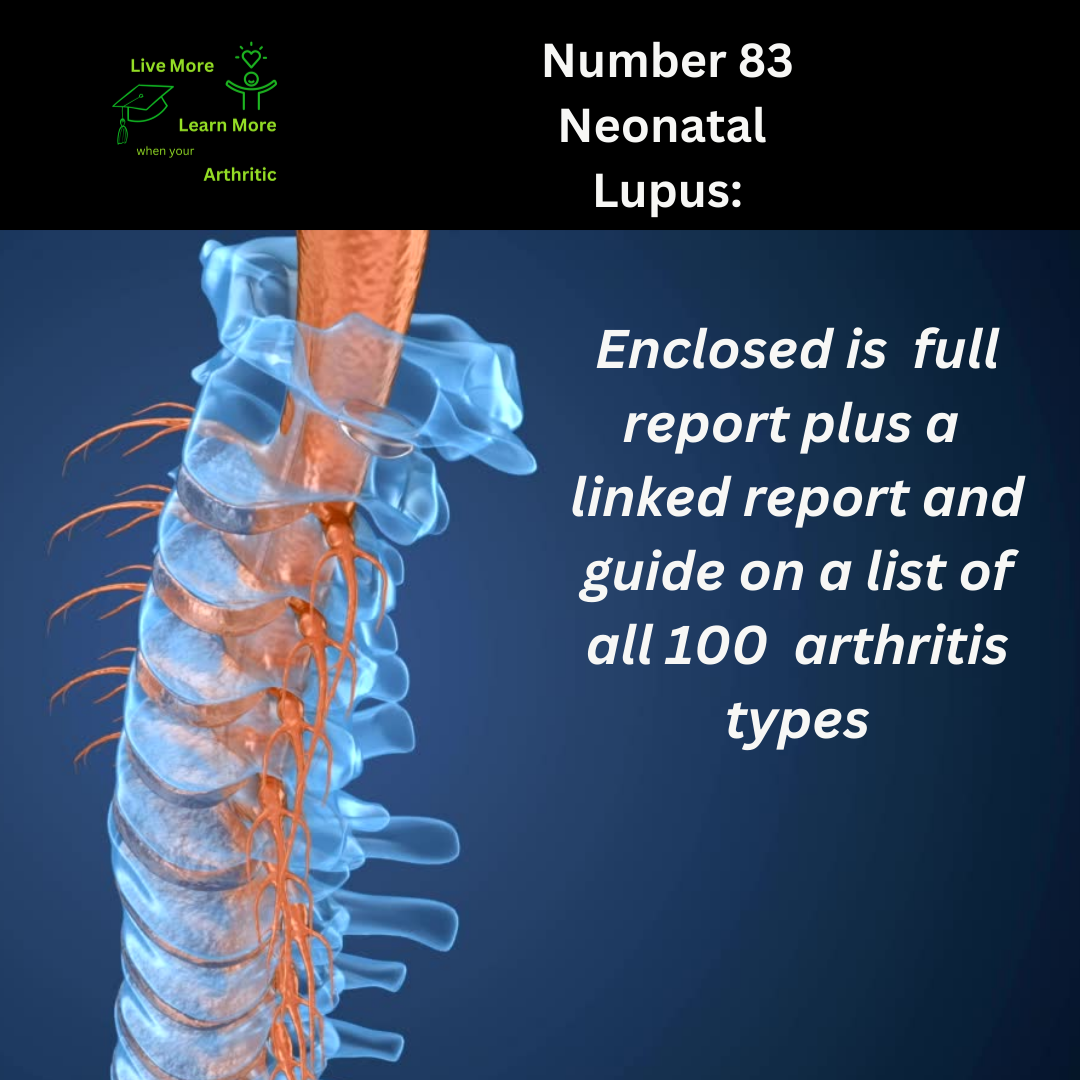
Neonatal Lupus: Number 83 on the list of 100 types of Arthritis
Understanding Neonatal Lupus: A Compassionate Exploration
Neonatal Lupus is a rare but significant condition that impacts newborns, often presenting a unique set of challenges. Unlike the more familiar adult-onset lupus, this condition emerges in infants due to maternal autoantibodies crossing the placenta during pregnancy. These autoantibodies, particularly anti-Ro and anti-La, can affect fetal tissues and organs, leading to a range of symptoms that vary in severity.
 Nature of Remission and Disease Description
Nature of Remission and Disease Description
Achieving remission in Neonatal Lupus is possible but complex. Remission often depends on the specific symptoms and their impact on the affected child. For example, skin rashes and some cardiac issues may improve over time, while more serious complications like congenital heart block can require ongoing management. The disease manifests differently in each case, ranging from mild skin conditions to more severe cardiac or systemic involvement.
Causes, Triggers, and Symptoms
Neonatal Lupus is triggered by maternal autoantibodies targeting fetal tissues expressing Ro/SSA and La/SSB antigens. These autoantibodies can lead to inflammation and damage within the developing fetus. The most common symptoms include skin rashes, cardiac abnormalities such as heart block, and sometimes liver or blood-related issues. Reduced fetal movement or joint problems may also be observed, affecting the infant’s range of motion.
4 more articles on Lupus you might enjoy:
Onset and Lifespan Impact
The onset of Neonatal Lupus typically occurs during pregnancy or shortly after birth. Although the condition is serious, its impact on lifespan can vary significantly depending on the severity of symptoms and the effectiveness of treatment. With appropriate care, many affected individuals can lead fulfilling lives, although some may face ongoing challenges due to cardiac or other complications.
Autoimmune Arthritis and Quality of Life
Neonatal Lupus can manifest as a form of autoimmune arthritis, potentially affecting joint mobility and causing discomfort. However, with proactive management strategies such as physical therapy and supportive care, individuals can often achieve a higher quality of life. The focus is on minimizing symptoms and maximizing function through personalized treatment plans.
Complications and Associated Conditions
Complications of Neonatal Lupus can be diverse, ranging from skin issues like rashes to more serious cardiac manifestations such as heart block. Additionally, some individuals with Neonatal Lupus may develop other autoimmune conditions later in life, underscoring the importance of ongoing monitoring and comprehensive care.
Breakthroughs and Natural Approaches
While medical management is crucial for Neonatal Lupus, certain natural approaches can complement traditional treatments. For example, maintaining a balanced diet and regular exercise routine can support overall health. However, it’s essential to consult healthcare providers before incorporating any alternative therapies to ensure safety and efficacy.
Epidemiology and Gender Disparities
Neonatal Lupus affects both genders, although certain autoimmune conditions like systemic lupus erythematosus (SLE) tend to be more prevalent in females. The condition’s incidence is relatively low, emphasizing the need for specialized care and awareness among healthcare professionals.
 Interconnected Health Concerns
Interconnected Health Concerns
Neonatal Lupus is often associated with other autoimmune conditions such as Sjögren’s syndrome or rheumatoid arthritis. Understanding these connections is crucial for comprehensive patient care, as shared immune pathways may influence disease progression and treatment responses.
In conclusion, Neonatal Lupus is a multifaceted condition that requires tailored approaches to management and care. While challenges may arise, advancements in medical understanding and personalized interventions offer hope for improved outcomes and enhanced quality of life for affected individuals. Ongoing research and awareness efforts are essential to furthering our understanding of this complex condition and optimizing therapeutic strategies.

